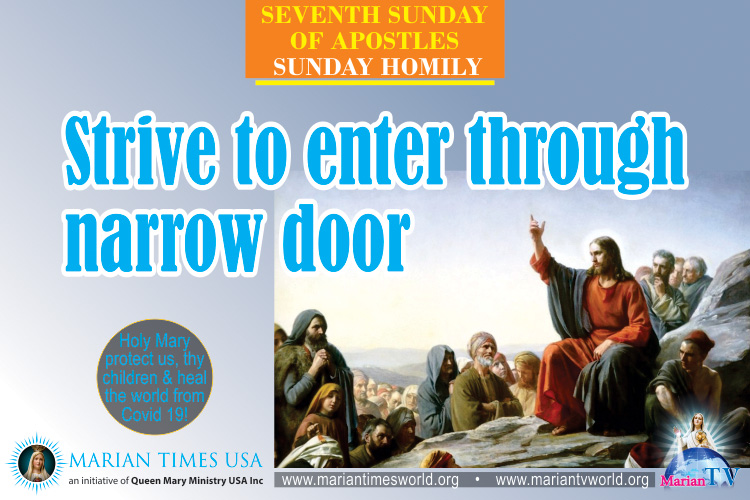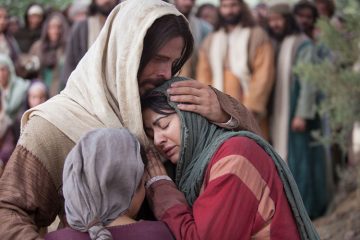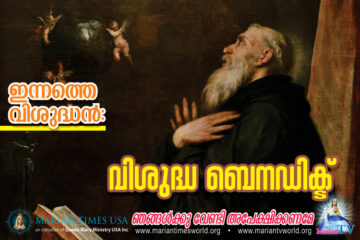STRIVE TO ENTER THROUGH NARROW DOOR (SUNDAY HOMILY)


~ Fr. Abraham Mutholath ~
Chicago, USA.
HOMILY: SEVENTH SUNDAY OF APOSTLES
HILIGHT
While traveling from Galilee to Jerusalem, Jesus preached in the towns and villages. Someone asked whether only a few would be saved. The answer of Jesus was that the door to the Kingdom of God is narrow and hard to enter. Many will try to go in but will not be strong enough. Only those who “strive”will be able to enter. Those who fail would be complaining that they were familiar to Jesus. Their dissatisfaction would be high when they notice that Abraham, Isaac, Jacob, the prophets and even the gentiles remain inside while they are cast out. A passive discipleship is not enough but a real dedication and commitment is required to inherit the Kingdom.
Enter through the Narrow Door. Luke 13:22-30
The Bible Text
Luke 13:22-30
(22) He passed through towns and villages, teaching as he went and making his way to Jerusalem. (23) Someone asked him, “Lord, will only a few people be saved?” He answered them, (24) “Strive to enter through the narrow door, for many, I tell you, will attempt to enter but will not be strong enough. (25) After the master of the house has arisen and locked the door, then will you stand outside knocking and saying, ‘Lord, open the door for us.’ He will say to you in reply, ‘I do not know where you are from.’ (26) And you will say, ‘We ate and drank in your company and you taught in our streets.’ (27) Then he will say to you, ‘I do not know where [you] are from. Depart from me, all you evildoers!’ (28) And there will be wailing and grinding of teeth when you see Abraham, Isaac, and Jacob and all the prophets in the kingdom of God and you yourselves cast out. (29) And people will come from the east and the west and from the north and the south and will recline at table in the kingdom of God. (30) For behold, some are last who will be first, and some are first who will be last.”
Interpretation
(22) He passed through towns and villages, teaching as he went and making his way to Jerusalem.
Jesus had gone to Jerusalem several times. However, this last journey to Jerusalem was to offer himself for crucifixion, the perfect and final sacrifice for the salvation of the people. Through his exemplary life, Jesus showed how to enter the kingdom of God through the narrow gate. Jesus was making use of his final journey also to inform the people of their last chance to change route of their life journey towards God by choosing the tough path instead of the easy way of selfish life.
Though traveling to Jerusalem, Jesus taught in towns and villages. He used to preach in Jerusalem where many used to gather for sacrifices, especially for the pilgrimage feasts. Jesus also used to preach in the synagogues on Sabbath where people used to gather to listen to the Word of God and worship. However, he went to towns and villages to reach out to the non-believers, gentiles and those who could not travel to the synagogue or Temple.
(23) Someone asked him, “Lord, will only a few people be saved?” He answered them,
The main concern of the questioner was on the number of people who would be saved rather than his own salvation or that of his own people. According to the popular teaching of the time, all Jews would inherit the kingdom of God because they were the covenant people. The gentiles were not eligible for salvation. However, Jesus’ teaching seemed different from that.So, the person who raised the question might have been confused as to how many would inherit the heaven. Jesus did not give a direct answer to the quantity of those to be saved. Instead, he focused on how the questioner and other listeners could gain salvation. The answer to the question was also implied in the subsequent teaching.
(24) “Strive to enter through the narrow door, for many, I tell you, will attempt to enter but will not be strong enough.
“Strive” is the key word here. It is not a simple entry through an easy door but maximum effort is required for this entry. It can be compared to an athlete who does all kinds of strenuous preparations to win the contest. St. Paul had clarified this, “Everyone who competes in the games goes into strict training. They do it to get a crown that will not last, but we do it to get a crown that will last forever.” (1 Cor. 9:25). Again, he says: “Fight the good fight for the true faith.” (1 Tim 6:12a).
The few or many who would be saved depends upon how many would strive to enter through the narrow door. Many might prefer the wide and easy door that do not require any struggle. Many others might wish to enter through the narrow gate but might not be strong in their persistence. During the public ministry of Jesus many who followed him left him because his teachings were too difficult for them to comprehend, especially his teaching on the Holy Eucharist (John 6:66). Later in the early church, many who were members of the church left the church because of persecution from the Jews and Romans, and because of the compulsion to give up the faith from their non-Christian family members.
Another reason for the failure to enter the narrow door for those who wish to enter might be because they would be too late to act and their time for action might be over. God can shut the door of life at an unexpected time. So, conversion and reconciliation cannot be postponed. They should be followed up by constant dedication and commitment for the church and the people. We see such lifestyle in the lives of many saints, especially St. Paul, St. Augustine, Fr. Damien of Molokai, and Mother Theresa of Calcutta.
Jesus is the only way to the Father (John 14:6) and he is the gate of the sheep (John 10:7). He re-entered heaven through the narrow gate. He told his disciples, “Whoever wants to be my disciple must deny themselves and take up their cross and follow me.” (Mathew 16:24). Jesus came not to substitute for our cross but to lead us with burdens of our life to the promised land like Moses led the Israelites to Canaan. An attempt to try to reach God without Christ would be a failure.
(25) After the master of the house has arisen and locked the door, then will you stand outside knocking and saying, ‘Lord, open the door for us.’ He will say to you in reply, ‘I do not know where you are from.’
The narrow door for salvation shall not remain open for long. God entrusted Jesus as the master of His house. He, who is seated at the right hand of the Father, would one day arise and lock the door to heaven. This can primarily be the end of our life in the earth. So, the time of repentance and entry through the narrow door is now and it cannot be procrastinated.
Once the end of life happens, the focus is not the narrow gate but Jesus who is the master of the house. Jesus is the mediator through whom the judgement would take place. It might be to Jesus that the people would ask to open the door for them also. They come close to the door of heaven but access through the door would be denied because it would already be shut and they would be late. So even the passive followers of Jesus could be denied of heaven.
Jesus would answer to those who would knock at the door, “I do not know where you are from.” This is not to be taken in a literal sense. Jesus know them because he is omniscient God. The meaning is that they do not belong to him. They were attending church services including preaching and worship. But they did not strive to practice his teaching in life like the Good Samaritan did in helping the helpless person. Like the foolish virgins who were waiting for the arrival of the bridegroom, they were cooperative but were not fully responsible servants.
(26) And you will say, ‘We ate and drank in your company and you taught in our streets.’
This could mean the contemporaries of Jesus who ate with him at the house of Zacchaeus, Lazarus or any other location. This also might include those who listened to his preaching in many places. Moreover, it could mean also those who took part in the Eucharistic meal in the church and listed to the Word of God. But there was no Christian outcome in their actions outside the church, especially in their dealing with their family members and community.We being Christians are not enough for selection at the last judgement. We are judged based on the Christian behavior that came out as outcome of our participation in the redemptive mystery of Jesus.
(27) Then he will say to you, ‘I do not know where [you] are from. Depart from me, all you evildoers!’
“I do not know where you are from” is repeated followed by strong command of “Depart from me.” This is close to the description of final judgement Jesus gives in the gospel of Matthew. “Then he will say to those on his left, ‘Depart from me, you cursed, into the eternal fire prepared for the devil and his angels. For I was hungry and you gave me no food, I was thirsty and you gave me no drink, I was a stranger and you did not welcome me, naked and you did not clothe me, sick and in prison and you did not visit me.’ (Mathew 25:41-43). A Christian who disregards the hungry, thirsty, stranger, naked, sick, or prisoner is “cursed” and considered as an “evil doer.” Just as Jesus called the Scribes and Pharisees hypocrites, he would consider the same for those who do not practice Christian charity.
(28) And there will be wailing and grinding of teeth when you see Abraham, Isaac, and Jacob and all the prophets in the kingdom of God and you yourselves cast out.
The Jews were proud of their patriarchs Abraham, Isaac, and Jacob. They believed that since Jews were the offspring of these patriarchs, their salvation was guaranteed. But according to Jesus, Jews who do not accept him as savior would be rejected while the patriarchs would be found in his kingdom. Salvation comes not by Jewish lineage but by practice of faith following the path shown by Jesus.
Jews and their ancestors had persecuted the prophets whom God sent to direct them to the right path of salvation. They will notice the prophets, whom they rejected and persecuted,also in the Kingdom of God.
“You yourselves cast out” is an expression of shame and agony for the Jews when they would see this happen beyond their expectation. Those who would be selected will be in the Kingdom of God where “He will wipe every tear from their eyes. There will be no more death or mourning or crying or pain, for the old order of things has passed away.” (Rev. 21:4). In contrast, those who would be cast out of heaven would end up in a place of horror. “But the cowardly, the unbelieving, the vile, the murderers, the sexually immoral, those who practice magic arts, the idolaters and all liars-they will be consigned to the fiery lake of burning sulfur. This is the second death.” (Rev. 21:8).
“Wailing and grinding of teeth” is an expression of severe anguish because of rejection from the Kingdom of God. Grinding of teeth is a physical expression of deep physical pain or mental agony. It can also happen because of anger as in the case of the trial of St. Stephen when the members of the Jewish council “were furious and gnashed their teeth at him.” (Acts 7:54). It is an expression of anger and dishonor.
(29) And people will come from the east and the west and from the north and the south and will recline at table in the kingdom of God.
The people from the four corners of the world represent the Gentiles who would also recline at the table in the Kingdom of God. This is the fulfillment in Isaiah 43:5, 45:6, and 49:12 that people of all nations would inherit the Kingdom. That was the reason for Jesus commissioning his disciples:“Therefore, go and make disciples of all the nations, baptizing them in the name of the Father and the Son and the Holy Spirit.” (Mathew 28:19). Those who were dispersed all over the world to 70 nations at the tower of Babel because of sin would be gathered in Jesus’s name in the new kingdom. So, the answer to the one questioned Jesus, whether there would be few to be saved, is answered indirectly stating that many would be saved beyond his expectation.
“Recline at table” represents the love, relaxation, joy, intimacy, and communion of saints at the Kingdom of God. During Biblical times, people were not sitting around the table as we do now. According to Jewish and Roman custom, the dining table was low slab with couches around its three sides. This was how Jesus used to eat at houses and at the last supper.
(30) For behold, some are last who will be first, and some are first who will be last.”
According to Biblical concept, the first are the Jews and the last are the Gentiles in front of God. The Jews misunderstood the plan of God and they did not expect salvation of the Gentiles. For Jesus, Gentiles are equally eligible to enter the Kingdom of God, provided they accept his gospel. Even in the history of Israel after Jesus, the nation that considered itself to be first, lost its nation and was scattered all over.
Message
- Jesus did not go straight from Galilee to Jerusalem to complete his mission. On the way, he was preaching through towns and villages addressing the lost sheep. He is a model for us Christians who are pilgrims to heaven. On our way to heaven, we need to address the needs of the downtrodden and convey the love of Jesus to them in our words and actions.
- Jesus is the perfect example of choosing the narrow door to enter the Kingdom of God. It was a life for self-sacrifice for others. We are also called to take up our cross and follow him. Let us reroute our life following Jesus, the way to the Father.
- “Strive” to enter the Kingdom of God is the key message of today’s gospel. According to Jesus, Jews were not guaranteed of salvation unless they strive to enter by a change of their selfish life. We Christians are also asked to strive by our works of Christian charity to enter God’s kingdom.
- A Christian shall not be a passive follower of Jesus or his Church. Practicing Christian rituals and attending liturgical services are not enough. Following the example of saints, we need to commit ourselves at the service of the Lord.
- The present time, is the best time to practice our Christian charitable work. We are not sure whether we would be alive or active to do any good tomorrow.
- Rejection or passivity of Jews in responding to the message of Jesus led to their fall. Let us put into practice our Christian faith so we shall enter the eternal glory of heaven.
മരിയന് ടൈംസിലെ ഇന്നത്തെ പ്രധാനപ്പെട്ട അപ്ഡേറ്റുകള് താഴെ ലഭിക്കുന്നതാണ്.









